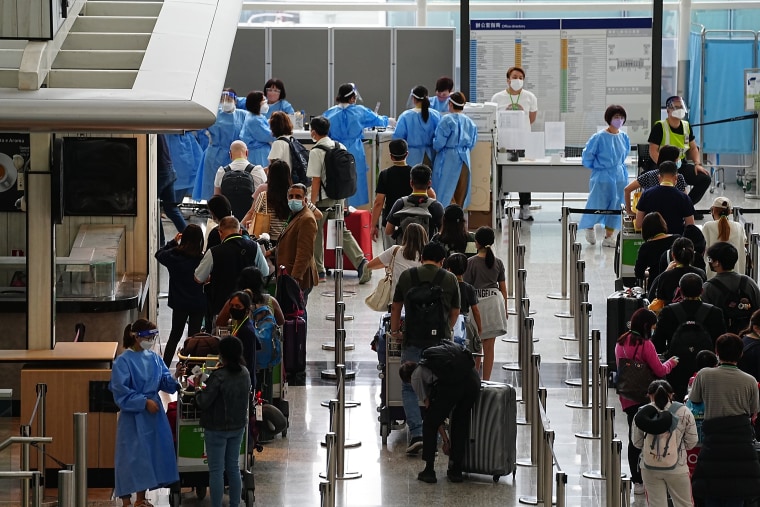HONG KONG — Hong Kong announced on Friday that it was lifting mandatory hotel quarantine for overseas arrivals, ending one of the world’s strictest Covid-19 policies as Asia follows other parts of the world in transitioning out of the coronavirus pandemic.
Since November 2020, the Chinese territory and international financial hub has required all arrivals from overseas to stay in a designated quarantine hotel for as long as 21 days, at travelers’ own expense. Travelers to Hong Kong — which is home to a large number of Americans and other expatriates — have often complained about poor conditions in the cramped hotels, as well as dramatic increases in prices that hotels set themselves.
Starting Monday, international travelers to Hong Kong will still have to take a P.C.R. test upon arrival at the airport, but they do not have to wait for the result. Their movements around the city will be restricted for the first three days after arrival, with entry to bars and restaurants prohibited until they pass a second test.
Hong Kong’s announcement comes a day after Japan and Taiwan also eased longstanding border restrictions. On Thursday, Japan said it would welcome all independent tourists starting Oct. 11, reinstating visa-free travel and lifting a cap on the total number of visitors.
Taiwan, which currently requires three days of home quarantine for overseas arrivals, said Thursday that it planned to end quarantine on Oct. 13, depending on the number of cases over the next week.
Countries like Australia, New Zealand and Singapore that closed their borders early in the pandemic are already fully open to outside visitors and have largely lifted restrictions.
The biggest outlier continues to be mainland China, the only major economy that has stuck with a “zero-Covid” strategy of closed borders, isolation of confirmed cases, mass testing and lockdowns. International travelers arriving in mainland China are required to spend at least 10 days in some form of quarantine.
This week, at least 27 people in Guizhou Province were killed in a bus crash on the way to a quarantine facility, drawing outrage online.
Chinese President Xi Jinping, who has staked his credibility on the success of “zero-Covid,” is unlikely to change course ahead of a crucial Communist Party congress next month at which he is expected to secure an unprecedented third term in office.
Chinese officials say their Covid policies have saved lives, pointing to high death tolls in the United States and other countries, but they have also contributed to an economic slowdown and led foreign investors to reconsider their long-term presence in the country.
“Ideology is trumping the economy,” the European Union Chamber of Commerce in China said in an annual position paper released on Wednesday.
Hong Kong, a former British colony that returned to Chinese rule in 1997 under the principle of “one country, two systems,” has been torn throughout the pandemic between two conflicting priorities: reopening its border with mainland China versus reopening to the rest of the world. Mainland officials signaled this week that they had no objection to Hong Kong easing its Covid policies.
After staying virtually Covid-free for the first two years of the pandemic as it followed Beijing’s lead, Hong Kong experienced a major outbreak last spring driven by the highly transmissible omicron variant. More than 7,500 people, most of them older and unvaccinated, died in less than two months, with photos of patients on gurneys spilling out into hospital parking lots drawing global attention.
The hotel quarantine policy, originally designed to protect the city from infections “imported” from overseas, has come under mounting criticism as the number of cases in the local community far outstripped the number of overseas arrivals testing positive for the virus.
The city of 7 million has reported an average of about 6,700 cases a day over the past week, fewer than 200 of them among arrivals from overseas.
Announcing the ease in restrictions on Friday, Hong Kong Chief Executive John Lee stressed the continued need to reduce the number of serious cases and deaths.
“We will not ‘lie flat,’” Lee said, using a Chinese phrase that means doing the bare minimum.
The city is also removing a requirement that travelers obtain a negative P.C.R. test within 48 hours of their departure for Hong Kong, replacing it instead with a rapid antigen test 24 hours in advance.
Though the announcement on Friday generated sighs of relief in Hong Kong, experts caution that it will take time for the city to recover from the damage of years of isolation. The restrictions have spurred an exodus of both local and foreign residents to rival financial hubs like Singapore, which jumped one spot ahead of Hong Kong to No. 3 on the Global Financial Centers Index published on Thursday.
Travel in and out of Hong Kong will also continue to be hampered by the limited number of flights, which airlines slashed in response to quarantine requirements for crew and other restrictions. Willie Walsh, director general of the International Air Transport Association, said this week that Hong Kong had lost its status as a global aviation hub as a result of its Covid policies.
